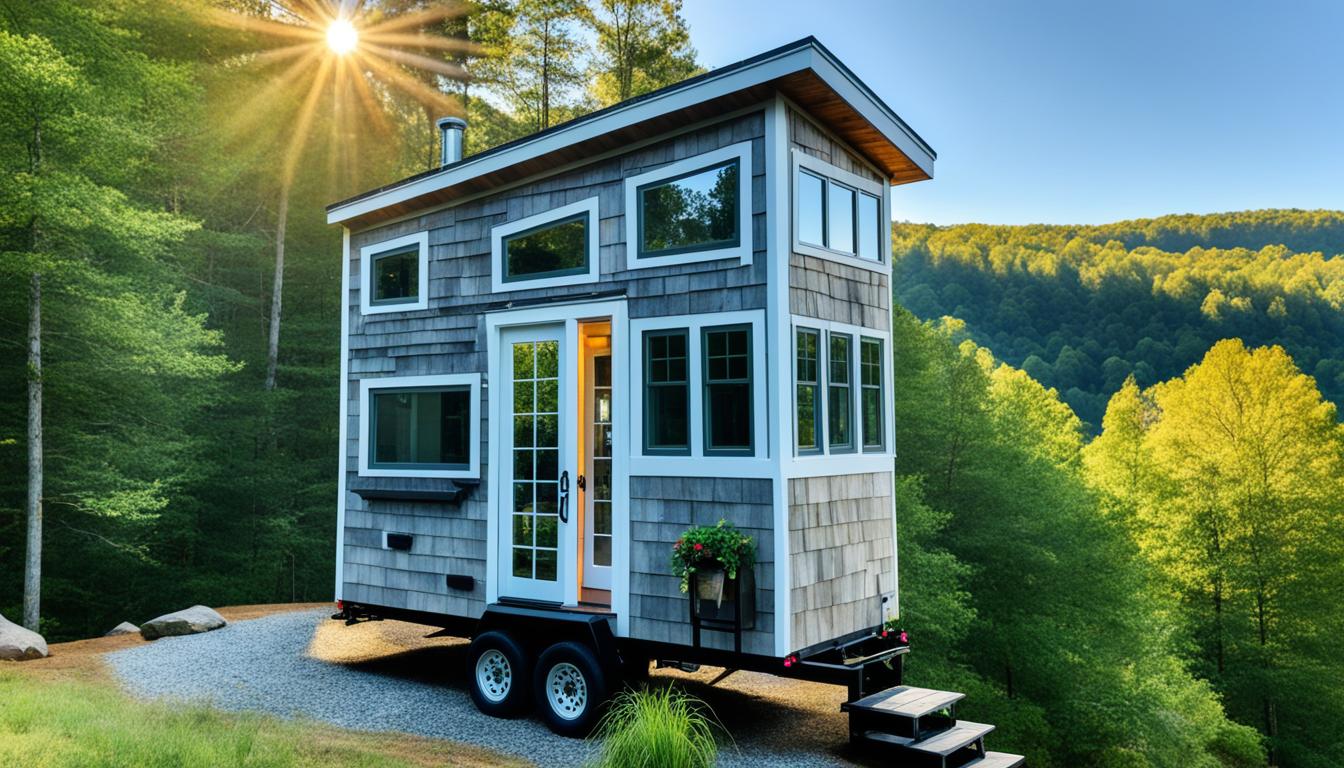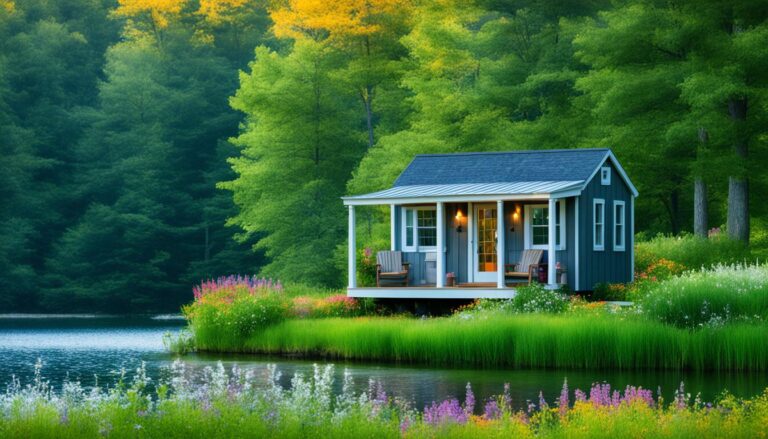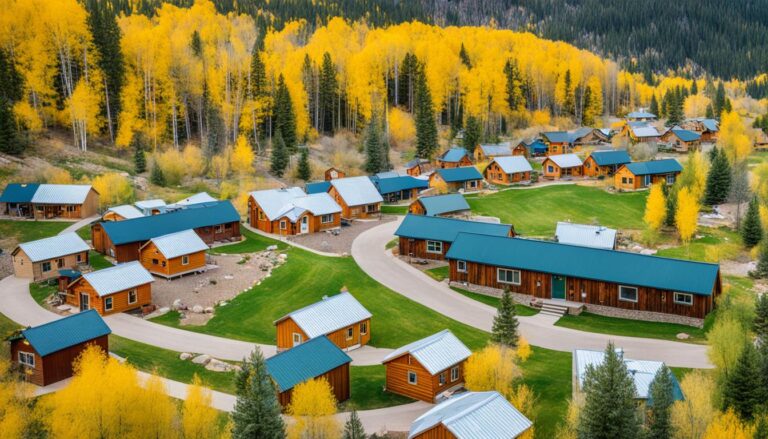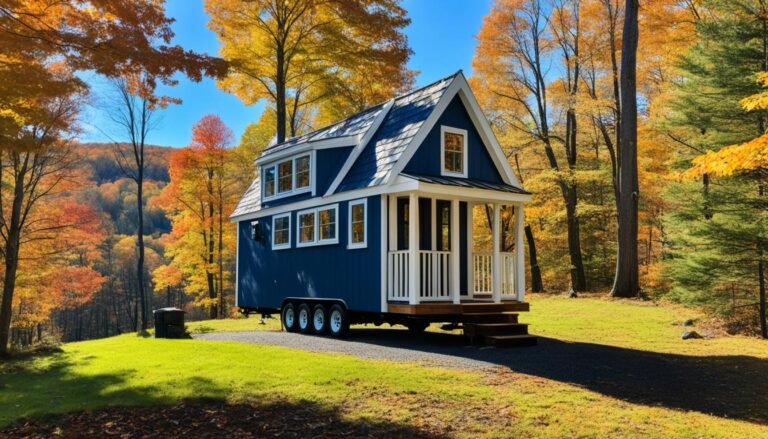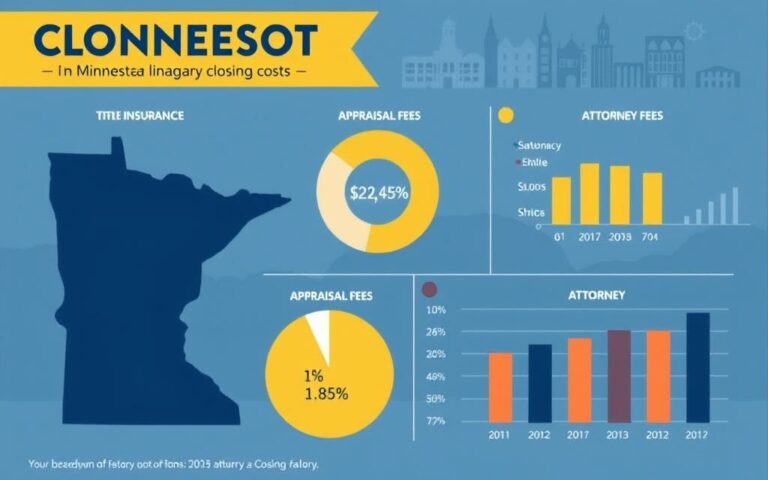Tiny House Placement in North Carolina: Guide
Did you know that tiny homes are legal in North Carolina, but the regulations surrounding them can vary widely? Each town, city, or county in the state may have its own definition and set of rules for tiny houses. If you’re considering joining the tiny house movement in North Carolina, it’s crucial to understand the laws and regulations that govern them.
In this guide, I will provide you with all the information you need to know about tiny house placement in North Carolina. From the legal requirements and zoning laws to the best locations for your tiny home, we’ll cover everything you need to make an informed decision. Let’s get started!
Key Takeaways:
- North Carolina allows tiny houses, but the regulations vary by location.
- Some counties in North Carolina that allow tiny houses include Mecklenburg, Buncombe, Guilford, and Jackson.
- The minimum size requirement for a tiny house in North Carolina can range from 120 to 800 square feet, depending on the county.
- Tiny houses on foundations are considered permanent residences, while those on wheels are not.
- Building codes and regulations for tiny houses in North Carolina vary by city and county.
Are Tiny Homes Legal in North Carolina?
When it comes to tiny homes, North Carolina has varying regulations depending on the town, city, or county. However, overall, tiny homes are legal in the state. It is essential to understand the legal requirements and zoning laws before embarking on your tiny house journey in North Carolina.
The first thing to consider is the minimum size requirement for a tiny home. Throughout the state, different cities have their own criteria. For example, some cities may require a minimum of 150 square feet for the first dweller and an additional 100 square feet per additional resident.
It’s important to note that tiny homes on foundations are generally considered legal permanent residences. However, if you plan to build a tiny house on wheels, it may not be recognized as a permanent residence under North Carolina law.
When it comes to building codes and requirements, each city or county within North Carolina has its own set of regulations. It’s crucial to research and understand these specific requirements before starting your tiny home construction project.
Overall, while tiny homes are legal in North Carolina, it’s essential to familiarize yourself with the legal requirements, zoning laws, and building codes specific to your chosen location. Doing so will ensure a smooth and legally compliant journey as you build and enjoy your tiny home.
What North Carolina Counties Allow Tiny Houses?
If you’re considering building a tiny house in North Carolina, it’s important to know which counties allow this type of housing. While regulations can vary between cities and towns, several counties in North Carolina have embraced the tiny house movement.
Some of the North Carolina counties that allow tiny houses include:
- Mecklenburg County
- Buncombe County
- Guilford County
- Jackson County
These counties have specific regulations in place that allow for the construction and placement of tiny homes. However, it’s worth noting that other cities and towns in North Carolina may also have regulations accepting tiny houses. Therefore, it’s important to check the local regulations before building to ensure compliance.
By understanding the counties in North Carolina that allow tiny houses, you can narrow down your options and find a suitable location to build your dream tiny home.
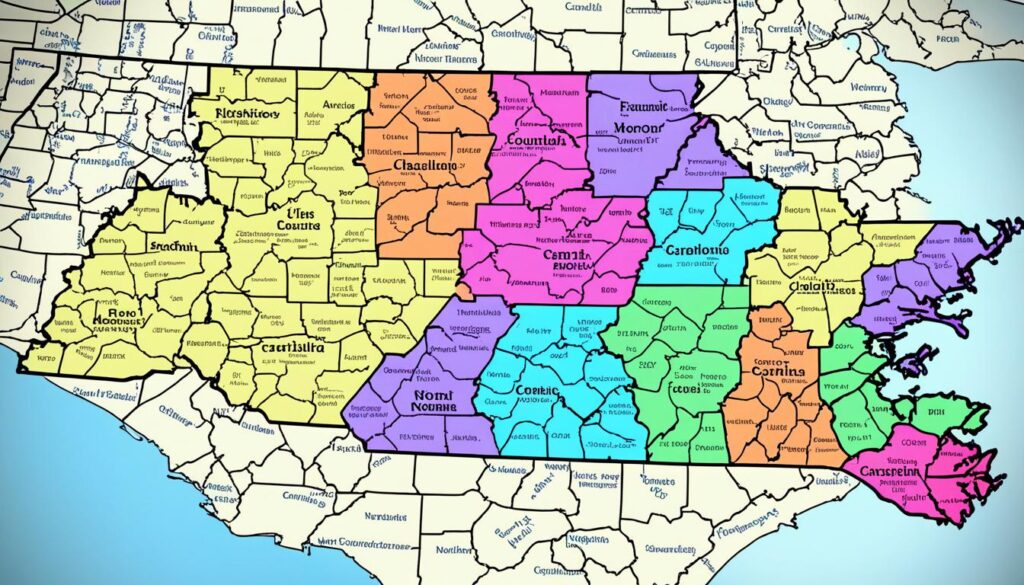
Can You Permanently Live in a Tiny House in North Carolina?
Living in a tiny house in North Carolina is indeed a possibility for those seeking a permanent residence that embraces minimalism and sustainability. However, the regulations governing this option depend on the type of tiny house and its foundation.
Tiny homes that are built on foundations can serve as permanent residences in North Carolina. These homes follow the same regulations and requirements as traditional houses, granting you the opportunity to enjoy all the benefits of a permanent dwelling.
Tiny homes on wheels, on the other hand, are not permitted as permanent residences within the state. While they offer the flexibility to be mobile, residents can only stay in these homes for a maximum of 180 consecutive days per year. This limitation is crucial to adhere to if you are considering a mobile tiny house lifestyle in North Carolina.
Alternatively, another viable option for a permanent residence is an accessory dwelling unit (ADU). ADUs can be either detached or attached to a single-family home and are recognized as legal housing units. By meeting specific requirements, ADUs provide an additional dwelling space that can serve as a comfortable, permanent tiny house.
In North Carolina, while mobile tiny homes have restrictions on permanent occupancy, there are various possibilities for those seeking a permanent residence in the tiny house movement. By understanding and complying with the regulations, you can make informed decisions and embrace the freedom and simplicity of living in a tiny house.
How Tiny Can a House be in North Carolina?
When it comes to the minimum size of a tiny house in North Carolina, the requirements vary by county. The tiny house movement has gained popularity, and different areas have adopted their own criteria to regulate these smaller dwellings.
In Jackson County, for example, a habitable room in a tiny house must have a minimum of 120 square feet of gross floor area. This ensures that there is enough space for comfortable living.
On the other hand, Wilmington and Charlotte have minimum size requirements of at least 150 square feet for the first dweller, with an additional 100 square feet per additional resident. This allows for a slightly larger living area to accommodate more people.
Meanwhile, in Raleigh, tiny houses are referred to as buildings of less than 600 square feet in gross floor area.
These size requirements for tiny houses in North Carolina aim to strike a balance between compact living and providing sufficient space for residents’ needs.
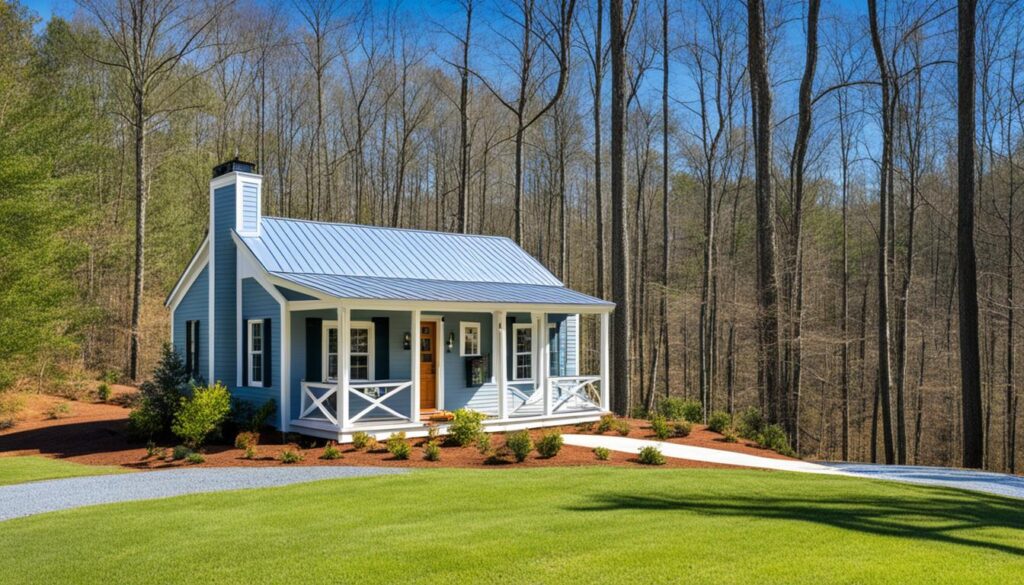
Summary:
- Jackson County: Minimum habitable room size of 120 square feet
- Wilmington and Charlotte: Minimum size of 150 square feet for the first dweller, with an additional 100 square feet per additional resident
- Raleigh: Buildings of less than 600 square feet in gross floor area
Rules and Regulations for Tiny Houses in North Carolina
When building a tiny house in North Carolina, it’s crucial to understand the rules and regulations that govern their construction. Building codes and requirements vary depending on the town, city, or county where you plan to build your tiny home. To ensure compliance and a smooth building process, here are some key factors to consider:
Zoning and Setback Requirements
Before embarking on your tiny house project, familiarize yourself with the zoning and setback requirements in your desired location. Different areas may have specific guidelines that dictate where and how tiny houses are allowed to be built. Zoning laws often stipulate the type of structures permitted and the minimum distance they must be set back from property lines and other structures.
Habitability and Size Specifications
When designing and constructing your tiny house, meeting habitability and size specifications is crucial. The North Carolina State Residential Code sets guidelines for habitable spaces, including minimum square footage and ceiling height requirements. It’s important to ensure that your tiny house complies with these standards to ensure a safe and comfortable living environment.
Permits and Inspections
Obtaining the necessary permits and undergoing inspections are essential steps in the building process. Depending on your jurisdiction, you may need to acquire building permits, electrical permits, and plumbing permits. Inspections will be carried out at various stages of construction to verify compliance with safety regulations and building codes.
Utilities and Facilities
Connecting your tiny house to utilities is another aspect to consider. Plumbing fixtures must be connected to an approved sewage disposal system to ensure proper waste management. The dwelling unit must also have heating facilities to provide adequate warmth during colder months. Additionally, complying with egress and energy conservation requirements is necessary to ensure the safety and sustainability of your tiny home.
For more information on building codes and regulations for tiny houses in North Carolina, refer to the businessinsider.com article that provides insights into these requirements.
By understanding and adhering to the rules and regulations, you can navigate the process of building a tiny house in North Carolina with confidence and peace of mind.
Where Can I Build a Tiny House in North Carolina?
Tiny houses offer a unique and flexible housing option in North Carolina. Whether you prefer the charm of a small town, the convenience of a city, or the tranquility of rural areas, there are numerous locations in the state where you can build your dream tiny house.
In North Carolina, there are several tiny house-friendly cities that provide opportunities for building or moving a tiny house while still offering privacy and access to metropolitan areas. Cities like Asheville, Durham, and Wilmington have embraced the tiny house movement and have established regulations and zoning codes that make it easier for residents to build and live in tiny homes.
If you prefer a more secluded lifestyle, there are also plenty of rural areas in North Carolina where you can build a tiny house. Living off-grid in a rural location allows you to enjoy the natural beauty of the state while still being within a reasonable distance of amenities and services.
When considering where to build your tiny house in North Carolina, it’s important to research local regulations and requirements. Each city, town, or county may have its own specific rules regarding zoning, permits, and building codes. It’s recommended to visit the official websites of the cities or counties you’re interested in to learn more about their specific regulations.
City Recommendations:
- Asheville: Known for its vibrant arts scene and picturesque mountain views, Asheville offers a thriving community that embraces tiny houses. The city has zoning regulations that allow for tiny house construction and placement.
- Durham: With its rich history and proximity to major cities like Raleigh and Chapel Hill, Durham is an excellent location for building a tiny house. The city has zoning codes that accommodate tiny houses.
- Wilmington: Situated on the coast, Wilmington provides a unique setting for tiny house living. The city has regulations in place that allow for tiny houses, providing a blend of coastal living and urban amenities.
To navigate the permitting process and ensure you meet all the necessary requirements, it’s advisable to consult with local authorities or professionals familiar with tiny house construction in North Carolina. They can provide guidance on obtaining the required permits and complying with building codes.
Remember, building a tiny house is an exciting venture, but it requires careful planning and adherence to local regulations. By choosing the right location in North Carolina, you can create a harmonious balance between your desired lifestyle and the benefits of tiny house living.
For more information on permits and regulations specific to building a tiny house in North Carolina, visit ncshedconversions.com/permits.
Do I Have to Pay Property Taxes for My Tiny House?
When it comes to property taxes for tiny houses in North Carolina, the situation is not as straightforward as it is for traditional homes. Traditional property taxes are not imposed on tiny houses in the state. However, there are certain factors that can affect the taxation of tiny houses in North Carolina.
If your tiny house is built on wheels and can be moved, it may be considered a recreational vehicle. In this case, property taxes may apply, similar to how they do for other RVs. It’s important to check with your local jurisdiction to understand the specific regulations and requirements for tiny houses on wheels.
On the other hand, if your tiny house is situated on a piece of land that you own, real estate taxes may come into play. Just like with any other property, if you own the land where your tiny house is located, you may be subject to property taxes on the land itself.
It’s essential to consult with your local tax authorities to get accurate and up-to-date information on the taxation of tiny houses in your specific area. They can provide guidance on the tax implications based on the type of tiny house and its location.
For more information on property taxes in North Carolina, you can visit the North Carolina Department of Revenue’s website.
Where Can I Park a Tiny Home in North Carolina?
If you have a tiny house on wheels and are looking for parking options in North Carolina, there are several possibilities to consider. Campgrounds, RV parks, short-term space rentals, and designated areas for long-term parking are potential options for parking your tiny home.
When choosing a place to park, it is crucial to adhere to local regulations to ensure compliance. Avoid parking recreational vehicles (RVs) on or within sight of the street, as this may violate local ordinances. Taking the time to research and understand the regulations specific to each location will help you find permissible parking locations for your tiny house in North Carolina.
For more information about tiny house regulations and permissible parking locations in North Carolina, you can refer to the official county documents provided by Iredell County, which outline guidelines and regulations for tiny homes and park models.
It’s important to note that tiny houses on wheels are typically intended for recreational or temporary living purposes. In North Carolina, residents can only occupy a tiny house on wheels for a maximum of 180 consecutive days per year. Therefore, it’s essential to consider any time limits or restrictions when choosing your parking location.
Conclusion
Transitioning to a tiny house in North Carolina requires careful planning and research. Understanding the rules and regulations, finding suitable locations, and considering utilities and infrastructure are essential steps. Various factors, such as legal requirements, minimum size, and access to services, play a role in placing a tiny house in North Carolina.
When it comes to placing a tiny house in North Carolina, it’s important to familiarize yourself with the specific regulations of the town, city, or county you plan to reside in. While tiny homes are generally legal in the state, the definition and requirements may vary depending on the local jurisdiction. Additionally, the minimum size of a tiny house can differ from one county to another.
To ensure a smooth and successful placement, consult the North Carolina State Residential Code, obtain the necessary permits, and adhere to zoning, setback, and habitable space requirements. In addition, consider the available infrastructure, such as access to sewage disposal systems and heating facilities.
By thoroughly researching and understanding the guidelines, you can confidently embark on your journey to place a tiny house in North Carolina.
FAQ
Are Tiny Homes Legal in North Carolina?
Yes, tiny homes are legal in North Carolina, but the definition may vary by town, city, or county. Each city or county has different building codes and requirements for tiny homes.
What North Carolina Counties Allow Tiny Houses?
Some North Carolina counties that allow tiny houses include Mecklenburg County, Buncombe County, Guilford County, and Jackson County. Other cities and towns in North Carolina may also have regulations allowing for the construction of tiny homes. It is important to check the local regulations before building.
Can You Permanently Live in a Tiny House in North Carolina?
Yes, it is possible to permanently live in a tiny house in North Carolina, but the regulations depend on the type of tiny house and its foundation. Tiny homes on foundations can be used as permanent residences. However, tiny homes on wheels are not allowed as permanent residences in North Carolina, and residents can only stay in them for a maximum of 180 consecutive days per year. Accessory dwelling units (ADUs) can also be used as permanent homes and can be either detached or attached to a single-family home.
How Tiny Can a House be in North Carolina?
The minimum size of a tiny house in North Carolina varies by county. Some counties, such as Jackson County, require a habitable room to have at least 120 square feet of gross floor area. Other cities, like Wilmington and Charlotte, have minimum size requirements of at least 150 square feet for the first dweller and an additional 100 square feet per additional resident. Raleigh refers to tiny houses as buildings of less than 600 square feet in gross floor area.
What Are the Rules and Regulations for Tiny Houses in North Carolina?
Building codes, rules, and regulations for tiny houses vary by town, city, or county in North Carolina. Tiny homes on foundations must comply with the North Carolina State Residential Code and obtain permits from the local jurisdiction. Tiny homes must meet zoning and setback requirements and have a habitable space with specified square footage and ceiling height. Plumbing fixtures must be connected to an approved sewage disposal system, and the dwelling unit must have heating facilities and comply with egress and energy conservation requirements.
Where Can I Build a Tiny House in North Carolina?
Tiny houses can be built in various cities, towns, counties, and rural areas in North Carolina. Some tiny house-friendly cities in North Carolina provide opportunities for building or moving a tiny house while maintaining privacy and access to metropolitan areas. It is also possible to live off-grid in a rural area in North Carolina, but permits and inspections for off-grid systems are still required.
Do I Have to Pay Property Taxes for My Tiny House?
Traditional property taxes are not imposed on tiny houses in North Carolina. However, property taxes may apply to tiny houses on wheels, as they are considered recreational vehicles. Real estate taxes may also apply if a tiny house is situated on a piece of land that the owner possesses.
Where Can I Park a Tiny Home in North Carolina?
If living in a tiny house on wheels, it is possible to park at campgrounds, RV parks, short-term space rentals, or designated areas for long-term parking. It is important to adhere to local regulations and avoid parking RVs on or within sight of the street. Tiny houses on wheels are meant for recreational or temporary living purposes and can only be occupied for a maximum of 180 consecutive days per year.
Conclusion
Transitioning to a tiny house in North Carolina requires careful planning and research. Understanding the rules and regulations, finding suitable locations, and considering utilities and infrastructure are essential steps. Various factors, such as legal requirements, minimum size, and access to services, play a role in placing a tiny house in North Carolina.

